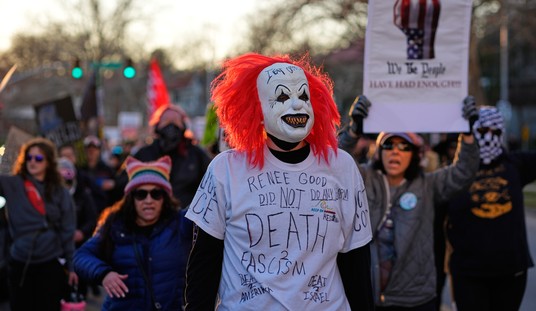In the New York Post, Kyle Smith on the aftermath — or at least the interregnum — of the London riots:
Just like the Monty Python sketch on how to rid the world of all known diseases: “Well, first of all become a doctor and discover a marvelous cure for something, and then, when the medical world really starts to take notice of you, you can jolly well tell them what to do and make sure they get everything right so there’ll never be diseases any more.”
But Cameron alone can’t give you the full flavor of the obliviousness of British political discourse; you must also savor the words of Labor’s top man, Ed Miliband — who called Cameron’s ideas “gimmicks” (true enough) and called instead for “a national conversation.”
“Solutions won’t be simple either,” he said, adding, “One of the most important things government can do is back families up, with programs like Family Intervention Partnerships.”
Nothing simple or gimmicky there!
Wondering what those mobs smashing pub windows were saying? “What do we want? Family Intervention Partnerships! When do we want ’em? Now!”
Miliband pointedly reminded us that we must spread the blame far and wide: “People who talk about the sick behavior of those without power, should talk equally about the sick behavior of those with power” — like those awful greedy bankers.
Meanwhile, third-party leader Nick Clegg, whose Liberal Democrats serve in a coalition government with Cameron’s Tories, declared, “I want offenders to be punished.” Well, up to a point: He let it be known to reporters (via weaselly background quotes) that he’s against cutting off welfare checks to the looters.
Anthony Burgess saw all of this coming in spite of himself back in 1962’s “A Clockwork Orange,” which some read as a satirical warning about unchecked hooliganism. In fact, most of the story is about the excesses of the state response to crime after the 15-year-old monster Alex is imprisoned and reprogrammed. The writer whom Alex and his droogs attack early in the story later uses Alex as a pawn in his campaign to paint the government as unduly harsh on crime.
Stanley Kubrick discarded Burgess’ incongruous happy ending for the 1971 film, which ends with a cosmic shrug: Ultraviolence may be evil, but so is the justice system. So learn to live among thugs.
Half a century after Burgess’s novel, the gamut of crime debate in Britain runs from A to A. The only point of dispute is what to label your gimmick — “a plan to get these families on track” or “Family Intervention Partnerships.”
To further complete England’s transformation into the zombified husk state that Burgess predicted nearly 50 years ago, James Bowman, frequent contributor to the American Spectator and the New Criterion writes that young thugs fearing the police is a controversial stance in London these days:
The headline news in the London Daily Telegraph over the weekend read: “Young thugs ‘should fear the police’ says David Cameron’s new crime adviser.” Gosh, ya think? Who is this “new crime adviser” with a gift for stating the obvious? He turns out to be none other than our own Bill Bratton, former head of the Boston, New York and Los Angeles police forces, who has been spoken of as a candidate for the vacant position of head of the London Metropolitan Police.
Speaking in New York, Mr Bratton, 63, said police forces should be more assertive in their dealings with offenders, leaving no doubt that crime would always meet a firm response. “You want the criminal element to fear them, fear their ability to interrupt their own ability to carry out criminal behaviour, and arrest and prosecute and incarcerate them,” he said. “In my experience, the younger criminal element don’t fear the police and have been emboldened to challenge the police and effectively take them on.” Some critics believe that British forces have been cowed by threats of legal action and a lack of political support for robust policing. Mr Bratton said officers should leave no doubt that they were ready and willing to use force when required. “What needs to be understood is that police are empowered to do certain things — to stop, to talk, to frisk on certain occasions, to arrest if necessary, to use force,” he said.
Not exactly controversial stuff, you might think. But in Britain, it appears, it is — and for the same reason I mentioned in my last post about discipline in schools, namely the fear of fear. On that occasion I argued, as I take Mr Bratton to be arguing here, that fear — also known as “respect” — is the foundation of good discipline. This kind of healthy fear is not the same as abject terror nor even, I would argue, the sort of insecurity we all feel before arbitrary fate, since the fear I mean, if properly engendered, carries with it a certain confidence that good behavior has nothing to fear. But your modern progressive mind is absolutist about fear. Indeed, the progressive project often seems to me to start from the assumption that it is the function of government, as of morality and decency, to abolish fear.
Orrin Judd adds, “That’s close to it in a nutshell.”










Join the conversation as a VIP Member